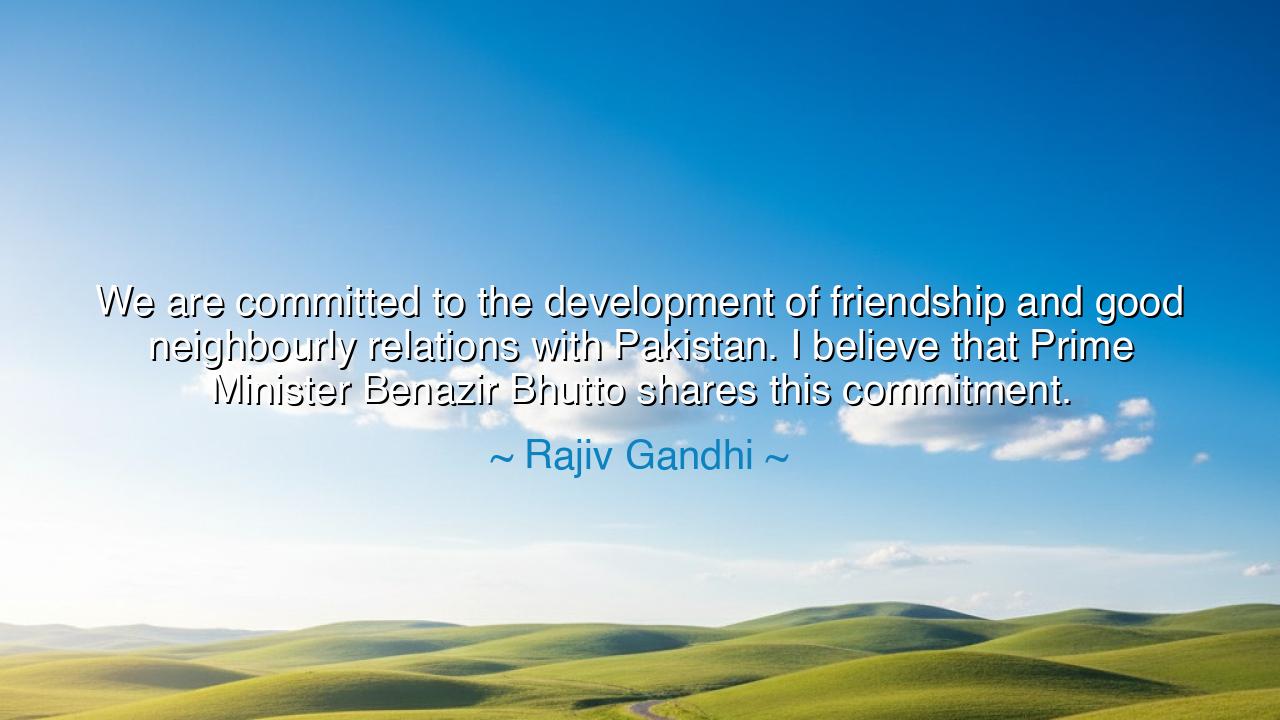
We are committed to the development of friendship and good
We are committed to the development of friendship and good neighbourly relations with Pakistan. I believe that Prime Minister Benazir Bhutto shares this commitment.






In the annals of history, there have been those who, despite the weight of division and conflict, have sought to build bridges, not walls. The words of Rajiv Gandhi, spoken in a moment of profound understanding, speak to this noble effort: "We are committed to the development of friendship and good neighbourly relations with Pakistan. I believe that Prime Minister Benazir Bhutto shares this commitment." These words echo with the wisdom of the ancients, who understood that the greatest strength of a nation lies not in its ability to conquer, but in its capacity to reconcile and forge bonds of peace. Gandhi’s vision was not of division, but of unity—a recognition that, though the lands may be divided by borders, the hearts of nations should not be.
At the heart of Gandhi’s message is the age-old belief that friendship between nations is not merely a diplomatic strategy but a profound moral choice, a choice that requires courage and conviction. The great Alexander the Great, though a conqueror by nature, sought alliances with those he conquered, realizing that true strength lay not in the subjugation of his neighbors, but in their cooperation. Likewise, the Roman Empire understood that the lasting peace of their dominion could only be secured through alliances, not endless wars. Gandhi’s vision for India and Pakistan reflected this ancient wisdom: a belief that despite the scars of history, the path forward must be one of mutual respect, cooperation, and shared prosperity.
Benazir Bhutto, the prime minister of Pakistan at the time, is the figure who stands beside Gandhi in this vision. Her commitment to peace and cooperation with India was a beacon of hope for the subcontinent, a reminder that leadership is not only about power but about the responsibility to guide one’s people toward a future of peaceful coexistence. Bhutto, like Gandhi, understood that history is not merely a record of past wounds but a map to guide future generations toward a more harmonious world. Her willingness to pursue friendship with India, despite the tensions and the complexities of their shared past, was a courageous act—a testament to the power of forgiveness and vision.
Yet, let us not be naïve in thinking that this commitment to friendship is without challenge. In every era, the journey toward peace is fraught with obstacles—be it historical grievances, political power struggles, or the deep-rooted fears of those who benefit from the status quo of division. The ancient Greek city-states, though often engaged in bitter rivalry, knew that their future rested not in perpetual warfare but in moments of peaceful collaboration, as exemplified in the Delian League, where former enemies worked together for mutual benefit. Similarly, India and Pakistan, though scarred by decades of conflict, have the opportunity to transcend the shadows of their past and build a future grounded in understanding and collaboration.
The wisdom here lies in understanding that true leadership is not the pursuit of individual glory, but the creation of unity and peace for the collective good. Rajiv Gandhi and Benazir Bhutto shared this understanding—a vision that recognized that the future of their people depended not on the continuation of hostilities, but on the cultivation of friendship. To lead is to serve others, to ensure that the legacy we leave behind is one of reconciliation, not division. They knew that in a world of shifting alliances and changing geopolitics, peace is the foundation upon which true strength is built.
In our own lives, we too must take these lessons to heart. In our personal relationships, in our communities, and in our nations, we are faced with the same choices Gandhi and Bhutto faced: do we seek to build walls or bridges? The lesson is clear: it is the building of bridges that leads to growth and unity, while the building of walls leads only to isolation and resentment. Just as Gandhi sought to transform the relationship between India and Pakistan, so too can we transform the relationships in our own lives. Whether it is overcoming personal grievances or political divisions, the path forward must always be rooted in the commitment to friendship and good neighborly relations.
Let this be the guiding principle for all future generations: peace and cooperation are not ideals that exist only in the realm of dreams, but tangible realities that we must pursue, each day, through our actions and our relationships. Like Rajiv Gandhi and Benazir Bhutto, we must cultivate the courage to look beyond our differences and reach out in friendship, for it is only through these acts of unity that we can build a future worthy of the generations that will follow. May we, like them, be remembered not for the walls we built, but for the bridges we created, and the peace we nurtured.






AAdministratorAdministrator
Welcome, honored guests. Please leave a comment, we will respond soon